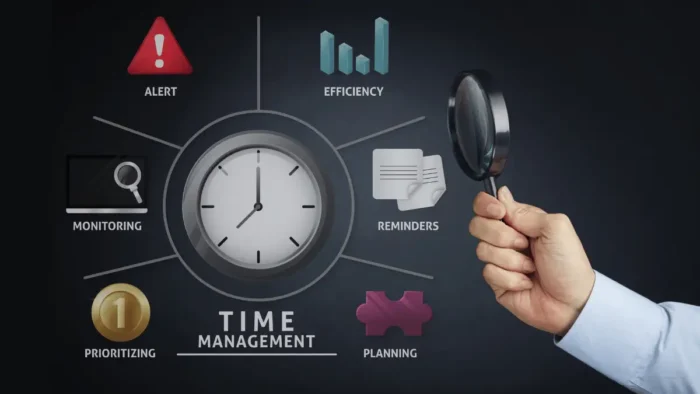One of the entrepreneurs‘ most important things is managing their time effectively. If they succeed in this effort, they will be more productive.
I know that sometimes this can be very disappointing for you if you can’t progress in your time management efforts.
You know you are the only person responsible for managing your time. The final result you want from time management is to allow you to do more things in less time with better quality.
On the other hand, if you succeed in effectively managing your time, you will achieve a much higher work-life balance.
Time management is an important part of the goal-achievement process.
An appropriate time management system allows you to manage time more effectively and do more things in less time.
📖 Key takeaways
- Time management is one of the most important aspects of your entrepreneurial journey because time investments will never be returned.
- There are vicious and virtuous cycles of time management that will impact your own success as an entrepreneur.
- You must find the right mix of time management tips, techniques, and tools that you can adjust according to your specific needs.
The Importance of Time Management for Entrepreneurs
Effective time management is the foundation of productivity and personal well-being for the driven self-starter. It’s about curating your work to align with your overarching goals and engaging yourself in tasks that substantially impact your bottom line.
It also nurtures resilience, allowing you to pivot swiftly when market conditions change or unforeseen challenges arise.
Yes, I know time management and possessing time management skills is important for every entrepreneur. But let’s look at it through the prism of investments.
As an entrepreneur, what types of investments do you have?
When we talk about your investments in the form of money in your company, we can say that this form of investment is in the renewable investments group.
You can invest more money in your company today and receive more in the future. If you lose money, you will find other ways to return the same or a larger amount.
Because of that, I look at entrepreneurial money investments as renewable investments.
Conversely, when you invest your efforts in your company, you can lose some of your energy and feel tired, but you can also rest your body and re-energize yourself to be prepared for the next effort investment.
So, again, investments through your own efforts are also renewable for you as an entrepreneur.
But what about time investments in your company?
Are they renewable?
No, the time invested in your company cannot be renewable. You will have only 24 hours a day, seven days a week, 28/29/30/31 days in a month, 365 days in a year, and the same day, week, month, or year will never return to your life. When you spend your time, you can’t bring it back. It’s the end of that particular time.
More time invested in your company means less time for yourself.
Successful Time Management VS Poor Time Management
Success in time management manifests when you strategically allocate your time to the most challenging tasks that directly contribute to your objectives, leading to efficient workflow, less stress, and better achievements and work-life balance.
For example, prioritizing high-impact activities and delegating or discarding less critical tasks improves your focus and generates higher returns on invested time.
I call it the virtuous cycle of time management.
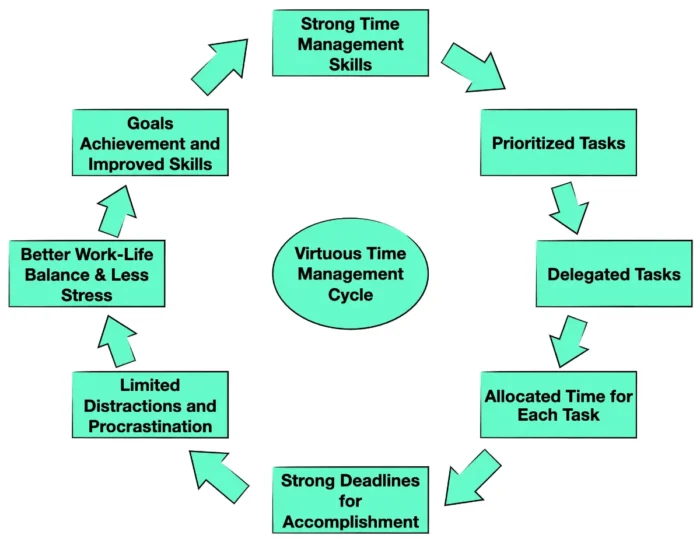
As you can see, strong time management skills will help you achieve your goals and learn so you will perform even better in the next cycle.
Conversely, poor time management is characterized by a random engagement with tasks, often falling victim to distractions or procrastination. I call this a vicious time management cycle.
Entrepreneurs trapped in this cycle tend to spend excessive time on low-priority activities, leaving insufficient time for critical business operations or innovation.
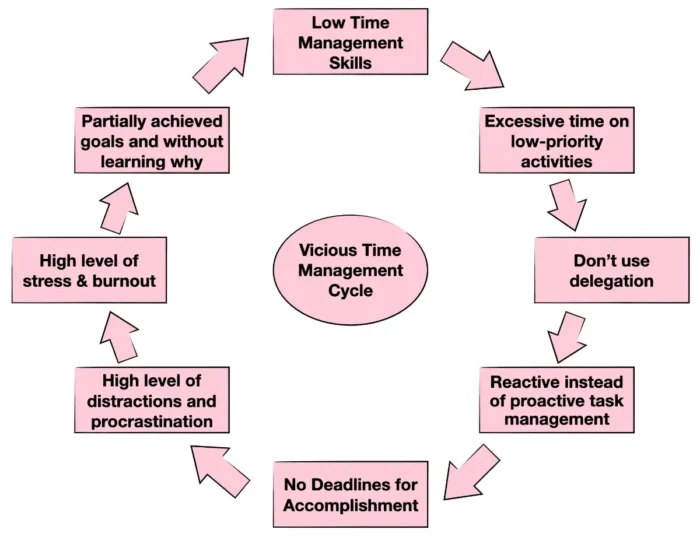
An example of poor time management is ignoring to plan the day ahead, resulting in reactive rather than proactive daily tasks management. This slows progress towards business goals and reduces your personal time, leading to higher stress levels and burnout.
Implications of Poor Time Management
As an entrepreneur, poor time management can have painful consequences for you and your business.
On the other hand, successfully managing your time can have many benefits for you.
Here are some possible implications of both:
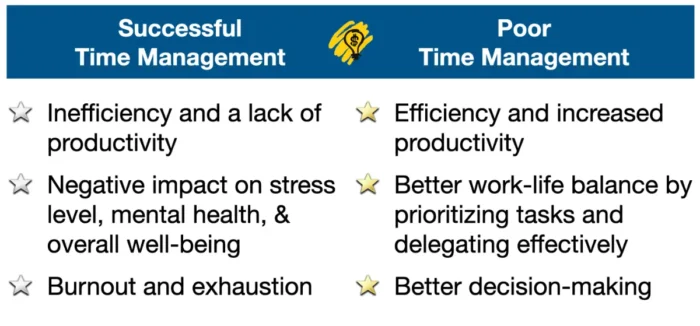
Time Management Strategies
You can use various tactics or time management tips and tools to manage your time.
According to my experience and many experiments, finding the right mix to support your work style, business model, and personality is most important. Remember that time management is not something you can set and forget; it is an ongoing process.
Here are some key strategies to explore:
1. Set up personal and business goals.
You need goals if you want to achieve them. They will help you prioritize your tasks and delegate some of them.
Remember that your goals should be SMART (specific, measurable, achievable, relevant, and time-bound).
You can follow this seven-step framework to help you achieve all your business goals.
2. Conduct a time audit
One of the most important questions for entrepreneurs is how they spend their time. Are they really too busy, and why?
Use services like Rescue Time for your computer-based time or a timer for your non-computer-based time to find how your time is allocated on average. The information you will receive from tracking your time will be invaluable in implementing effective time management systems.
Tracking as alone is not important if you don’t take the next steps to improve how you will spend your time tomorrow. If you spend too much time on unproductive or unimportant tasks, you will have a large space for improvement.
Your time management efforts will need to focus on those areas of improvement.
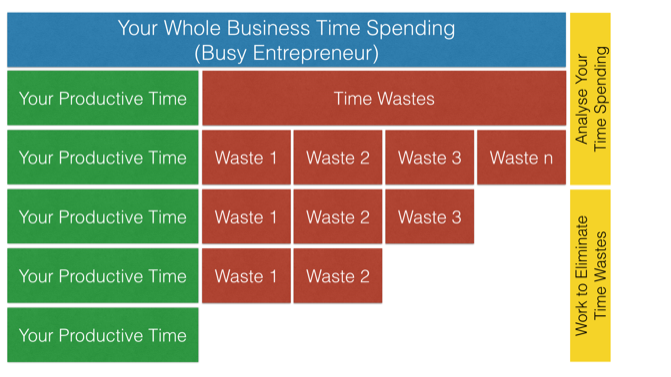
The following question will help you narrow down your current position and future regarding your time spending so that you can become productive instead of a busy entrepreneur.
Step #1: What really means a waste of time for you?
The first step is to answer this important question for you.
For someone who wastes time watching TV, someone else will not think the same because he is watching TV only to learn something new.
For someone, a waste of time is when he or she is on the internet, but someone who uses Facebook to grow his business will not think so.
Related: 6 Steps to Increase Business Productivity Next Week
So, think about yourself and possible categories of time that you are currently spending that can be considered time wasters.
Step #2: How do you spend your time now?
When you know what will be a waste of your time, you must analyze your current time spending. Take a notebook and pen, and write down how you currently spend your time each day for the next several weeks.
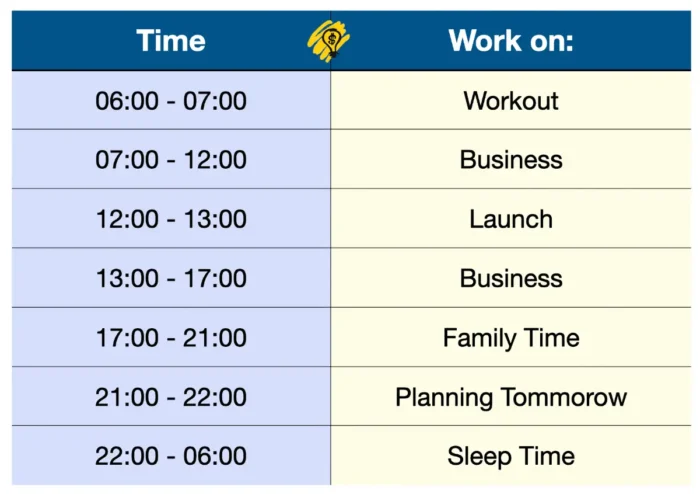
Now, you can analyze your business-related time in more detail.
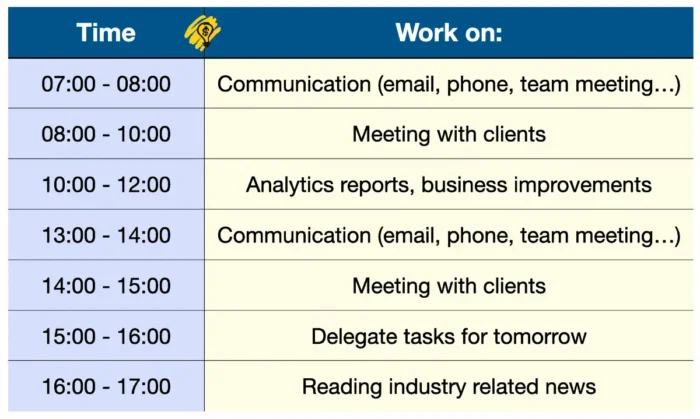
Step #3: Are you wasting too much time?
It is time to categorize the data you collected in the previous step. Think about the following questions:
- What activities have you done in the analyzed period of time that are time wasters for you?
- When are you wasting most of your time?
- How you are wasting your time?
Step #4: How would you like to spend your time in the future?
The last step is the improvement step, or answering the question of how you would like to spend your time in the future.
Think about the future and eliminate all time-wasters in your business life. Focus on important things and become more productive instead of a busy entrepreneur.

3. Prioritization Techniques
Now that you know where you spend your time, you can continue with this time management strategy: categorize the tasks according to their priority.
While staying on top of all your responsibilities is important, you must also learn to prioritize your tasks.
How can you prioritize?
Let’s look at some techniques you can use for prioritization:
The Eisenhower Matrix for Prioritization
This powerful tool, popularized by President Dwight D. Eisenhower, categorizes tasks into four quadrants based on urgency and importance.
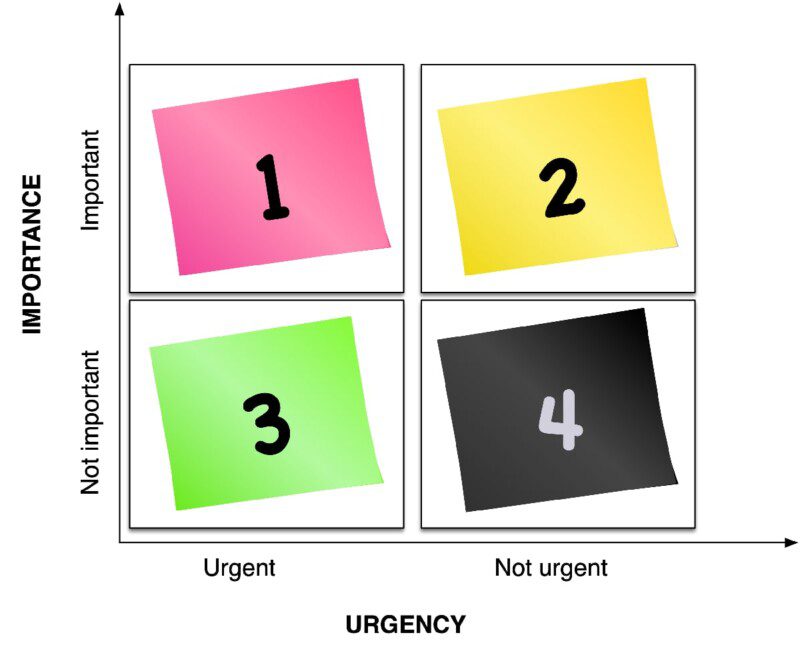
- Quadrant 1: Important and urgent (you should do it immediately).
- Quadrant 2: Important, not urgent (you should schedule to do after the tasks from the first quadrant).
- Quadrant 3: Urgent, non-essential tasks (you should delegate to others or outsource).
- Quadrant 4: Not urgent and not important task (you should eliminate).
I have already written a post about this tool regarding your productivity and your time spent. The time management matrix will give you four quadrants, which you can use in prioritizing and deciding about tasks you will need to do as the number one priority, tasks that can be delegated, and tasks that you can delete and forget about.
ABCDE Method
Another method of prioritizing tasks involves assigning A, B, C, D, or E to each item, with A being the most significant and E being the least significant for your business.
Using this method, you will ensure that you accomplish tasks in a logical and efficient manner, first, the most urgent tasks that are also most important, then everything else.
Here’s how to implement the method and assign priority letters to each of your tasks:
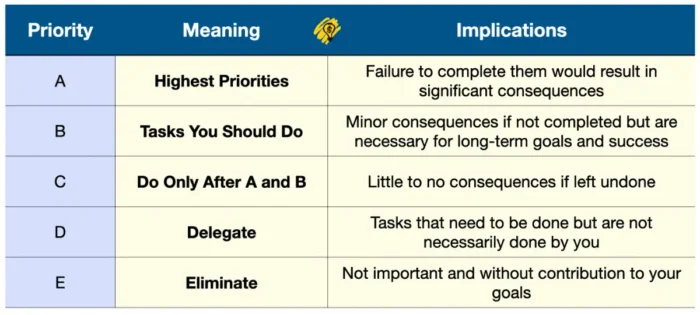
Pareto Principle – 80/20 Rule
The Pareto Principle, or the 80/20 Rule, suggests that 80% of outcomes result from 20% of actions. Focusing on the critical 20% of tasks will increase productivity.
Related: Improve Your Business Performances With ABC Analysis or 80/20 Rule
4. Learn to Say No
One of the entrepreneur’s biggest challenges today is saying no.
Whether covering for a colleague at work, helping out a friend, or attending a relative’s event, these unplanned occurrences can often get the better of us and throw us off schedule.
We want to please everyone and seize every opportunity, but this is impossible (or not sustainable).
You must learn to say no so that you can focus on the things that matter most.
5. Delegate tasks

It’s easy for entrepreneurs to try to do everything themselves. However, this is not only impossible but also unnecessary.
One way to increase your productivity while spending your time on the most important tasks is to start with the delegating process in your business. Everything that can easily be done by one of your team members can be delegated so you can have more time for important things you need to do.
So, you must learn to delegate tasks to other team members and regularly review the progress made on the implementation. This will allow you to focus on the things that only you can do.
Related: 6 Steps Delegation Process to Increase Your Productivity as a Manager
6. Outsourcing
In addition to delegating tasks to your team members, you can outsource some non-essential work.
Outsourcing gives you space to focus on more important things in your business. Instead of spending hours on tasks like social media management, you can hire someone else to do it for you.
In such a way, outsourcing will free up your time, allowing you to focus on the tasks that bring in revenue and grow your business.
7. Always make and keep a fresh to-do list.
If you want to be a more organized person and succeed in managing your time effectively, you will need to use a to-do list.
Make your to-do lists practical.
Avoid tasks like “Work on education overhaul with school principal” type of tasks that clearly require more than a day’s work.
By using small tasks, you’ll knock down a fair number of to-dos and create momentum for more.
Also, you can set reminders for the most important tasks at a dedicated time on a specific day to ensure that you do not forget to work on them.
8. Plan Your Time
Today’s work can’t be planned as we have in the past. It must be done in a more chaotic environment than we can imagine.
But, without proper planning for your day ahead, you will easily find yourself in a very frustrating position where you work more hours, but the results aren’t what you want them to be.
Sometimes, there are not enough days to have only daily plans; you will also need weekly plans. Your weekly plans should include a list of the most important activities that you will need to do in the upcoming week. With such a plan, you can easily make weekly reviews and successfully manage your daily plans.
9. Implement systems to manage and minimize distractions and procrastination.
Distractions are everywhere today because of the electronic devices we use.
The web is the chief time-wasting medium. From researching fantasy sports leagues to reading movie reviews to wandering around social networks, there are far too many distractions available.
Do your best to avoid them. You must have self-discipline and maintain focus on completing tasks on your to-do list.
You can follow this guide to help you effectively manage interruptions in your environment.
Related: 14 Tactics to Eliminate Distractions When You Work on Important Things
Also, if you want to ensure an effective time management system, try to eliminate or minimize procrastination regarding your most priority tasks. Here are five techniques to help you overcome procrastination and win on your entrepreneurial journey.
10. Use Technology for Productivity
With the help of a little technology, you can manage your time effectively.
From project management tools like Asana or Trello to automation software like Zapier, carefully chosen technologies can streamline operations, reduce manual work, and enhance team collaboration.
The first thing you will need is a to-do app and project management tool that can help you track delegated tasks.
You can add things to your to-do app if you need to. This way, you can also budget your time better, as you can see everything you need to do during the day.
Also, think about technology that can help you do more work with less effort and better quality.
For example, if you want to save a lot of time on projects that involve transcribing audio to text, it’s better to have an audio transcription tool. One such tool is the audio-to-text transcription service like Audext or Amazon Transcript, which is a part of their web services.
11. Time Blocking and Scheduling
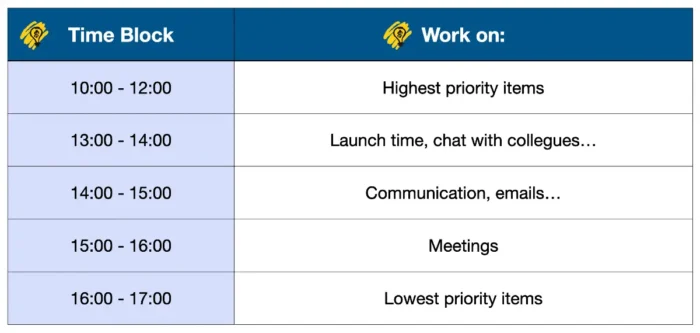
Time blocking is the act of allocating specific blocks of time for specific tasks. For example, each day, you can dedicate specific blocks like:
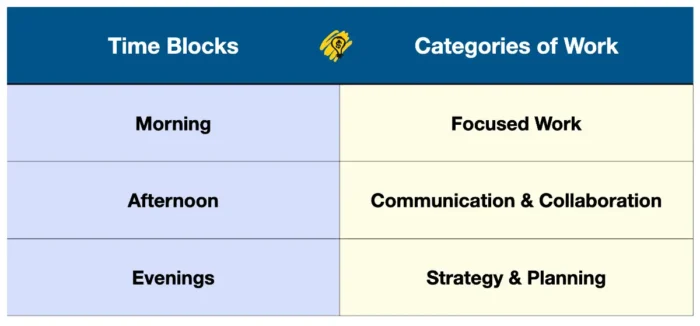
Time management tools, such as calendars, can be valuable because they are the quickest and easiest ways to manage your day’s activities and schedule your time effectively.
Whether you prefer to keep a digital time log using an app, a calendar linked to your email, such as Google Calendar, or a good old-fashioned journal or physical planner, keeping a log of appointments and duties means they never slip through the cracks.
12. Take a break between tasks
It’s also important to take breaks every once in a while. Get up and step outside for some fresh air. This will help you clear your head and stay focused on your work.
Working for long periods without a break causes our minds to lose focus, reducing productivity. So, make sure to take a few minutes every couple of hours to step away from your work and clear your head.
You can even take a short walk between tasks or after some specific period of time.
It doesn’t matter if you manage an online casino like PartyCasino or teach classes, simply you must take breaks.
It might seem counterintuitive, but taking breaks can actually help you get more done.
You need breaks to increase your productivity and energize yourself. So, take more short breaks when you work on important things.
13. Set Up Deadlines
Deadlines will set up time limits and ensure tasks are completed within a reasonable and planned timeframe.
Setting deadlines will help you stay on track with your work, provide you with a sense of urgency, and maximize productivity.
Be realistic when setting deadlines for yourself or your team. Unrealistic deadlines can lead to unnecessary stress, burnout, and decreased productivity.
Use project management tools to set deadlines and track progress on each task and project.
14. Avoid Multitasking
Multitasking is a time management technique that decreases your overall productivity.
So, why will you multitask when there is the possibility of decreasing the quality of your work?
The human brain is not designed for constant context and task switching. Focus on one task at a time, and you’ll find that quality and efficiency both increase.
15. Get Enough Sleep
Sleep is essential for being more productive at work and being healthier and happier. Yet so few of us can sincerely say they regularly get the full amount they need.
Being overtired can have serious consequences: scattered memory, physical exhaustion, and increased stress, none of which are conducive to better time management.
Ensure you get a full 7-8 hours every night for optimum cognitive and physical performance.
How Can You Improve and Always Have Good Time Management Skills?
Now that you have a better understanding of the importance of time management and some tips for improving it, here are a few additional ways to continuously improve your time management skills:
- Time audits are the best learning opportunities. Regularly assess and track how you spend your time. When you measure and analyze something, you will always learn something new. In this case, tracking how you spend your time will help you identify any areas where you may have wasted time or not prioritized effectively.
- Be flexible and adaptable in your approach to managing time. What works for one person may not work for another, so don’t be afraid to try different techniques and tools or the right mix of them adjusted to your unique needs.
- Continuously educate yourself on time management and productivity methods. New strategies and tools are developed almost daily, so you must stay up-to-date to discover and test them and find what works best for you.
- Practice self-discipline and self-control. As I already mentioned, time management is an ongoing process. Without discipline and control, you can not learn anything new, improve yourself and your team members, or achieve your goals.
- Always improve your processes. Remember these tips, and always look for new ways to simplify your business operations, reduce manual work as much as possible, and improve your team collaboration.

